|
|
|
Sort Order |
|
|
|
Items / Page
|
|
|
|
|
|
|
| Srl | Item |
| 1 |
ID:
123776
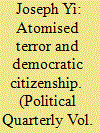

|
|
|
|
|
| Publication |
2013.
|
| Summary/Abstract |
This essay connects the 2103 Boston Bombings to the dynamics of a highly individualist, modern society. The perpetrators (Tsarnaev brothers) represent an atomized stratum of Americans, disconnected from communal institutions and organizations; socially insignificant men, ready to commit publicized, albeit isolated, acts of violence. With the exception of the World Trade Center, major terrorist attacks in the past two decades have been perpetrated by asocial, isolated individuals. An expansive security and welfare state is an inadequate response to atomized terror and is potentially problematic for our liberties. An approach more consistent with security and freedom is to nurture the rights and responsibilities of democratic citizenship.
|
|
|
|
|
|
|
|
|
|
|
|
|
|
|
|
| 2 |
ID:
123775
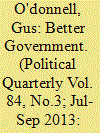

|
|
|
|
|
| Publication |
2013.
|
| Summary/Abstract |
The decline in future trend economic growth coupled with the ever increasing demands of an ageing population mean the public sector will need to deliver better for less. This will require a smarter bureaucracy using the latest behavioural advances and using wellbeing as a measure of success. Spending will need to be directed more to prevention rather than cure. Radical tax and benefit reform is needed to make work pay and offset the rise in inequality.
Decision making could be improved by attracting more diverse, experienced people into politics by, for example, more use of open primaries, a level playing field for independent candidates and better training. Ministers could be set proper objectives and have constructive appraisals.
A proposed Office of Taxpayer Responsibility could screen policies to avoid the worst ones, backed by no evidence, from being introduced as it is very hard to abolish bad policies.
|
|
|
|
|
|
|
|
|
|
|
|
|
|
|
|
| 3 |
ID:
123771


|
|
|
| 4 |
ID:
123768


|
|
|
| 5 |
ID:
123774


|
|
|
|
|
| Publication |
2013.
|
| Summary/Abstract |
Democratic governments have spent much of the last two decades attempting to recalibrate their governance systems around a single focal entity: the citizen. The all-pervasive rhetoric of citizen-centred governance has seen policies conceived, delivered and evaluated in terms of the satisfaction levels achieved by individual 'citizens'. This article argues that by disaggregating societal interests down to the smallest available individual unit - the citizen - policy makers have created unrealistic expectations of individual participation, leading to public distrust when 'citizen-centred' rhetoric does not match reality. Simultaneously, the focus on individual outcomes has narrowed the policy-making gaze away from wider society-level measures that could create more robust policy options in the face of 'hard choices.' The result - paradoxically - is that the more government focuses on pleasing the individual citizen, the less trusting those citizens are of government's ability to deliver meaningful outcomes.
|
|
|
|
|
|
|
|
|
|
|
|
|
|
|
|
| 6 |
ID:
123772
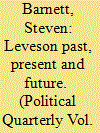

|
|
|
|
|
| Publication |
2013.
|
| Summary/Abstract |
As a result of the phone-hacking scandal and evidence of other serious journalistic abuses by some newspapers, the government set up the Leveson Inquiry to hear evidence from victims and to make recommendations for a new and effective system of press regulation. Leveson's recommendations for independent self-regulation overseen by a "recogniser" was seen as a moderate solution which would uphold the principle of an unfettered press while providing appropriate protection from unscrupulous or unethical press behaviour. After historic cross-party agreement, Parliament passed a resolution accepting a Royal Charter which adopted the great majority of his recommendations. In response, Britain's main national newspapers have pursued a campaign of systematic misinformation and distortion, aimed at discrediting the inquiry, its supporters and the cross-party Charter, while promoting a different system which would remain almost wholly controlled by the industry and would in practice be little different from the discredited Press Complaints Commission. After decades of ineffectual political response to press abuse and press power, there is now a historic opportunity for Parliament to assert its sovereign power. Over the next 12-18 months, we will see whether we have reached a genuine milestone in British public life or whether the British press will remain the last bastion of unaccountable power.
|
|
|
|
|
|
|
|
|
|
|
|
|
|
|
|
| 7 |
ID:
123769
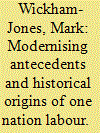

|
|
|
| 8 |
ID:
123770
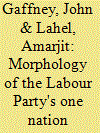

|
|
|
| 9 |
ID:
123778
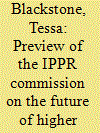

|
|
|
|
|
| Publication |
2013.
|
| Summary/Abstract |
Review of a Critical Path Securing the Future of Higher Education in England: the final report of the IPPR Commission on the future of Higher Education. The focus of the review is first on the funding of Higher Education and the options set out by the IPPR which include lower tuition fees, a graduate tax, means tested family contributions and changes to the loan repayment scheme; and second on better ways of widening participation and expanding opportunities for under-represented groups of students.
|
|
|
|
|
|
|
|
|
|
|
|
|
|
|
|
| 10 |
ID:
123767
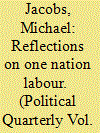

|
|
|
| 11 |
ID:
123777
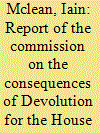

|
|
|
|
|
| Publication |
2013.
|
| Summary/Abstract |
The report of the McKay Commission on the Consequences of Devolution for the House of Commons is reviewed. The Commission, which contained experts on parliamentary procedure, raised a number of important and difficult questions; the answers are less impressive than the questions. In view of the difficulties of any scheme, including that proposed by the Commission, for what is popularly known as "English Votes on English Laws," policymakers should revisit one of the options that was specifically ruled out of McKay's terms of reference. This would be a reduction in the numbers, but not the powers, of MPs from Scotland, Wales, and Northern Ireland in the way that applied to Northern Ireland between 1922 and 1979.
|
|
|
|
|
|
|
|
|
|
|
|
|
|
|
|
| 12 |
ID:
123773


|
|
|
|
|
| Publication |
2013.
|
| Summary/Abstract |
Some commentators have observed that today's Cabinet ministers are younger and less experienced than their predecessors. To test this claim, we analyse the data for Labour and Conservative appointments to Cabinet since 1945. Although we find some evidence of a decline in average age and prior experience, it is less pronounced than for the party leaders. We then examine the data for junior ministerial appointments, which reveals that there is no trend towards youth and inexperience present lower down the hierarchy. Taking these findings together, we propose that public profile is correlated with 'noviceness'; that is, the more prominent the role, the younger and less experienced its incumbent is likely to be. If this is correct, then the claim that we are witnessing the rise of the novice Cabinet minister is more a consequence of the personalisation of politics than evidence of an emerging 'cult of youth'.
|
|
|
|
|
|
|
|
|
|
|
|
|
|
|
|
| 13 |
ID:
123779
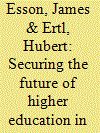

|
|
|
|
|
| Publication |
2013.
|
| Summary/Abstract |
This article reviews the IPPR commissioned report 'Securing the Future of Higher Education in England'. It is argued that the report identifies key shortcomings in contemporary higher education policy, and develops some important recommendations for shaping the sector in the future. However, several of the proposed recommendations would create new divisions in the sector and reinforce existing ones. Moreover, the report maintains and reproduces the ideological status quo of contemporary higher education policy, which can broadly be described as the organisation and provision of higher education along 'quasi-market' lines. Crucially, although the report advocates reform based on social justice, in the contemporary context of fiscal retrenchment, the majority of recommendations are underpinned by, arguably necessary, economic rationales.
|
|
|
|
|
|
|
|
|
|
|
|
|
|
|
|
| 14 |
ID:
123780


|
|
|
|
|
| Publication |
2013.
|
| Summary/Abstract |
Anthony Painter's report for Policy Network correctly describes populism as a 'democratic argument' which sets up a morally pure 'people' against vilified 'elites', in binary opposition. This is an argument which is increasingly prominent in political discourse, whether the elites in question are political, financial or technocratic. Painter focuses on the now-familiar 'radical right-wing' version of populism, as reflected across Europe in the rise of parties such as the UKIP. He omits discussion of other types of populism (of the left and centre), which perhaps represent the future for populist politics.
|
|
|
|
|
|
|
|
|
|
|
|
|
|
|
|
|
|
|
|
|